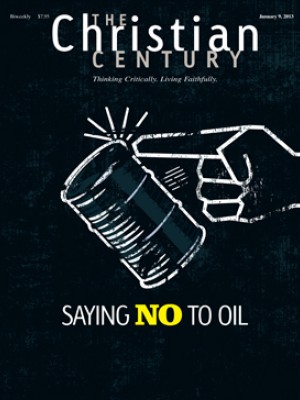Massacre galvanizes 'cross lobby' on gun control
The shooting deaths of 26 children and adults at a Connecticut elementary school has revived religious support for gun control, galvanizing a movement that has struggled to gain traction against the powerful gun lobby.
“We are going to win this and save lives, and faith leaders will not need to be pulled into that,” said Ladd Everitt, spokesman for the Washington-based Coalition to Stop Gun Violence. “They will be at the forefront of that.”
Everitt said rank-and-file people of faith have flooded his office’s e-mail and social media accounts, giving donations and offering to volunteer in their communities following the shootings at Sandy Hook Elementary School in Newtown, Connecticut, on December 14.
Episcopal bishop Mariann Edgar Budde of Washington is teaming up with Gary Hall, dean of Washington National Cathedral, to “dedicate ourselves to the work of passing national legislation to ban the sale of assault weapons and ammunition in this country.”
Read our latest issue or browse back issues.
Everyone in Washington “seems to live in terror of the gun lobby,” Hall said, “but I believe the gun lobby is no match for the cross lobby.”
Even though the gun control debate has been relatively dormant in recent years—despite high-profile mass shootings in Arizona, Colorado and elsewhere—religious voices have been a key part of the gun control coalition.
“Any time this movement has made a push, whether you’re looking at the Brady bill, the assault weapons ban or the 1968 Gun Control Act, faith leaders have been at the forefront of that,” said Everitt, whose coalition was started by religious activists. “We can’t win without them. We need them.”
Faiths United to Prevent Gun Violence worked earlier this year to prevent passage of the National Right to Carry Reciprocity Act, which would have made it easier for people to carry concealed weapons, said Vincent DeMarco, the group’s national coordinator.
In the wake of the Newtown shootings, DeMarco said “the possibilities are much better” to try again to renew a Clinton-era ban on assault weapons that expired in 2004. “The faith community is committed to doing this, and it makes sense and it will happen,” he said, “and this sad tragedy in Connecticut is only going to add to the commitment.”
His coalition of 39 Christian, Jewish, Muslim and Sikh organizations was launched in 2011 after the shooting in Tucson, Arizona, that killed six and injured then-Arizona congresswoman Gabrielle Giffords. It is affiliated with the Brady Campaign to Prevent Gun Violence.
Rabbi David Saperstein, director of the Religious Action Center of Reform Judaism, said religious leaders are already discussing possible next steps after the killings in Connecticut. Religious groups alone cannot move new legislation forward, said Saperstein, a longtime gun control advocate, but “if political leaders move, the religious community will galvanize to support it.”
Speaking at an interfaith vigil December 16 in Newtown, President Obama said “these tragedies must end.” Religious coalitions and denominations quickly urged the White House and Congress to act.
For example:
• The African Methodist Episcopal Church urged Congress not to be intimidated by the gun lobby and to reform gun laws in light of “the consequences of reckless gun use.”
• Members of the Presbyterian Church (U.S.A.) “must do our part to responsibly end gun violence,” urged PCUSA executives Gradye Parsons and Linda Valentine, citing the church’s past recommendations for change.
Despite the groundswell, not all clergy are convinced that stricter legislation is appropriate.
Joseph Mattera, presiding bishop of the New York–based evangelical group Christ Covenant Coalition, wrote in Charisma News that he doesn’t agree with New York Mayor Michael Bloomberg’s call for improved background checks and tighter gun laws.
Mattera, instead, is concerned about the secularization of U.S. society. Likewise, former Baptist minister and Arkansas governor Mike Huckabee commented on Fox News that the longtime ban on organized prayers in classrooms has contributed to increased violence in society.
Five national officers of the progressive United Church of Christ, including General Minister Geoffrey A. Black, urged church members December 14 to “renew our efforts to control guns” and prevent such violent tragedies.
Among pastors who commented online on the UCC appeal was Jon Prain of the Federated Church, Avon, Illinois, who said most members of his congregation own firearms. Within hours of the “horrid event,” Prain said, gun-control advocates were trying to advance their cause. “In my opinion, using this tragedy for political gain is almost worse than the murders themselves,” he wrote. —RNS
This article was edited Dec. 20, 2012.





